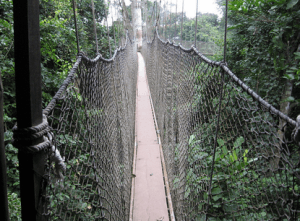Ghana pursuing sustainable ecotourism as solution to climate crisis
 Ghana is pursuing a sustainable ecotourism development agenda as one of the local solutions to addressing climate change impact on the environment.
Ghana is pursuing a sustainable ecotourism development agenda as one of the local solutions to addressing climate change impact on the environment.
The country is also employing the same strategy to protect her unique plants such as timber and non-timber species.
The non-timber species include Talbotiella gentii, a critically endangered tree in Ghana, animals such as elephants, leopards, and baboons, and insects like the butterfly.
This is in line with the tenets of the recently adopted “Kunming-Montreal Global Biodiversity Framework (GBF),” a global accord, agreed on at the 15th Conference of Parties to the UN Convention on Biological Diversity, which has four goals and 23 targets, that seek to ensure humans live in harmony with nature.
As part of the agenda, portions of ecotourism sites that have been degraded are being restored through the Community Resource Management Area, a concept to co-manage natural resources with host communities.
Biodiversity protected areas like the Shai Hills Resource Reserve, Mole and Kakum National Parks have seen a facelift with enhanced facilities/infrastructure to improve ecotourism products and services.
Dr Richard Gyimah, the Director, Stakeholder and Ecotourism at the Wildlife Division, Forestry Commission, who disclosed this to the Ghana News Agency in Accra on Thursday, said climate change had a strong correlation with biodiversity, hence the Division’s efforts to restore affected areas.
“When you conserve plants and animals, they will continue to offer valuable environmental services, which include absorbing carbon dioxide from the atmosphere to reduce climate change effects,” he said.
“To maximise the climate benefits of forests, we want to keep more forest landscapes intact, manage them more sustainably.”
This has the potential to contribute over one-third of the total climate change mitigation required by 2030.
The Director said the quest to keep flora and fauna resources of the 21 wildlife protected areas in the country intact would also enable visitors to those areas to see nature and enjoy it at its raw state.
Responding to the question of biodiversity degradation in the country, Dr Gyimah acknowledged that although activities including logging, illegal farming and mining had damaged portions of forests, the Division had commenced efforts to restore affected areas.
He said the destructive activities were largely linked to livelihood issues, therefore, the Division was working with community members on innovative ideas to ensure sustainable use of resources and, in some instances, find alternative livelihoods to meet their daily needs.
The ecotourism agenda would be an avenue to generate income and contribute significantly to the economy.
Although Ghana has not fully developed its ecotourism sector, it contributed about $1.2 billion, representing some 5.5 per cent of the Gross Domestic Product (GDP) in 2020.
In 2021, the travel and tourism sector contributed around $3.1 billion to the country’s GDP.
Ghana, in line with international best practices, last year developed her first Ecotourism Handbook with Quick Response Code (QR) to promote and advertise her ecotourism endowments.
The QR code, when scanned, links one directly to tourist destination websites that contain information on all the ecotourism areas, facilities, types of animals and their location.
Source: GNA
